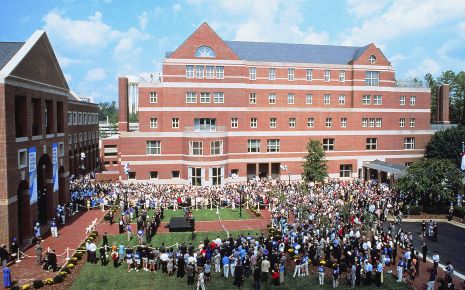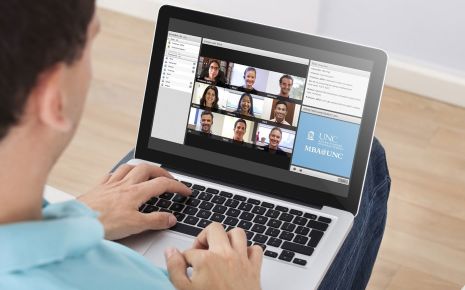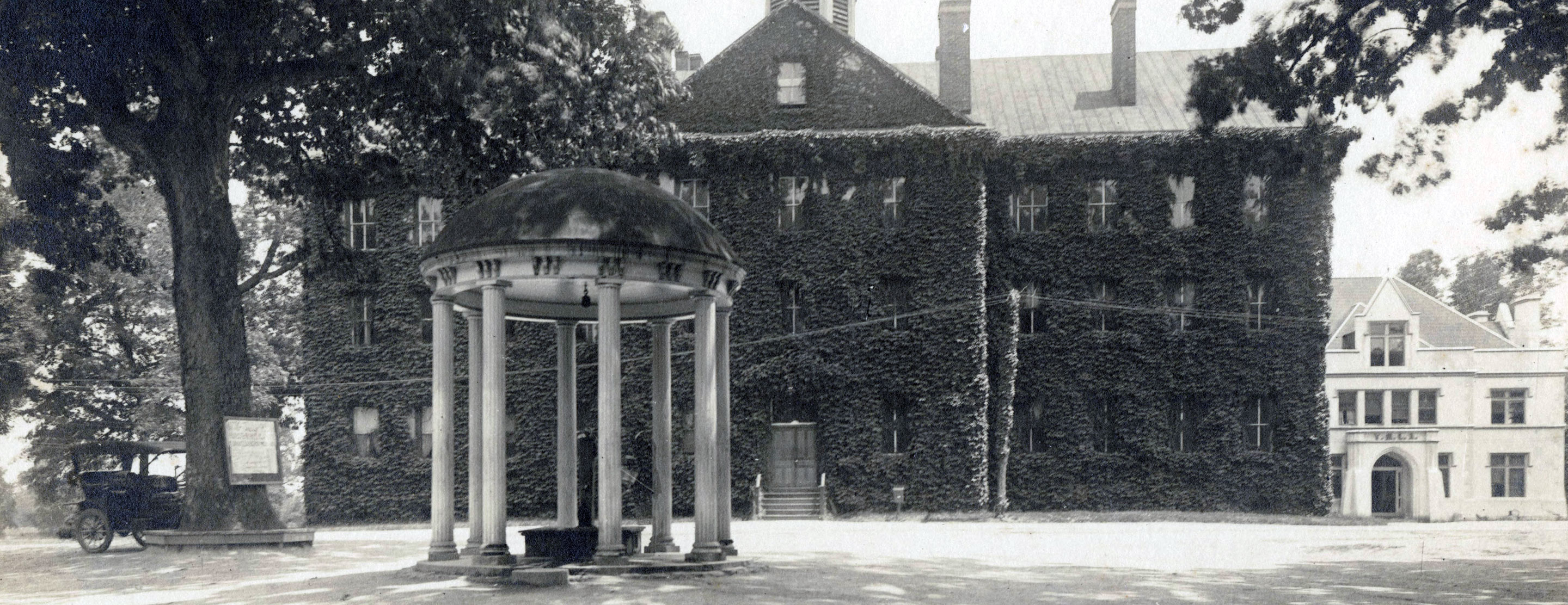A history of tradition and innovation
The power of education to improve lives is an enduring story. Our story began in 1919 when UNC’s leaders envisioned a role for business education at a liberal arts university. That vision ultimately became UNC Kenan-Flagler Business School.
Business has changed dramatically in the last century, as have we. But what first made us unique still remains — a tradition of innovation. From our earliest roots, UNC-Kenan Flagler has perpetually looked forward to develop the knowledge needed for the next generation of business.
We have changed the lives of thousands of people, directly and indirectly, since our founding in 1919 and seek to deepen and broaden our impact on people’s lives and the wider society. Join us on our journey to define what’s next. The best is yet to come.

1919 Innovating from the start
UNC President Edward Kidder Graham recognizes North Carolina’s need to develop business leaders to build its business and industrial sectors. The Department of Commerce begins with 125 students led by our first dean, Dudley D. Carroll. He imbued the department with a standard of ethics and broad view beyond the dollar signs of profit that endures.
1921 Graduating our first class
UNC awarded the first degrees of Bachelor of Science in Commerce to 12 students, including William D. Carmichael Jr., namesake of UNC’s basketball arena.
1928 Awarding our first PhD
Today our PhD Program continues to prepare the next generation of faculty who create knowledge as researchers and shape young minds as teachers at top business schools around the world.

1946 Upping our game
Seeing the state’s future written by business graduates, some 250 business and political leaders from across the state form the North Carolina Business Foundation to support the School of Commerce. Its funds radically transform our offerings through faculty salary supplements, research staffing, technology enhancements and scholarships.

1952-53 Launching MBA and executive programs
We begin offering our Full-Time MBA Program in 1952 and non-degree programs for executives in 1953. Today we offer the MBA in five formats and UNC Executive Development serves leaders and their organizations through custom programs.

1956 Laying the foundation
Maurice W. Lee begins his 20-year tenure as dean, leaving his mark for building an all-star faculty who excel at both teaching and research – a standard that continues today. He also launches a management simulation course that puts seniors in charge of their own companies to make policy, investment and budget decisions throughout the course of the semester. Experiential learning becomes a cornerstone of our curriculum.

1965 A trailblazer
Lewis Burton is our first African-American graduate. He spent more than 40 years providing advisory services to clients, helping them start and achieve their dreams. Classmate Coleman Ross established The Lewis M. Burton Master of Accounting Fellowship in his honor in 2015.
1973 Formalizing a commitment to diversity
We are the first Southern institution and sixth overall to join the Consortium for Graduate Study in Management, a cooperative network of universities established to give African-Americans, women, Hispanic Americans and Native Americans the business skills they need to secure positions in U.S. corporations.

1985 Master of Accounting Program launches
You find our alumni at all of the Big Four accounting firms, middle-market firms, global corporations, public-sector entities, startups and nonprofit organizations. Carolina accounting graduates have a profound influence on the accounting profession, both nationally and internationally. In 2014, we broaden access to our MAC Program by offering it in an online format.

1985 Fostering private enterprise
The Frank Hawkins Kenan Institute of Private Enterprise stimulates economic prosperity and improves the lives of people in North Carolina, the U.S. and around the world.
1986 Earning your MBA while you work
We start our first program for business people to earn their MBAs while working: the Evening Executive MBA Program.

1991 An extraordinary gift, a formal name change
Frank Kenan continues his family’s legacy of supporting UNC by giving $10 million toward a new business school building. The School’s name is changed to Kenan-Flagler Business School in honor of Mary Lily Kenan and her husband, Henry Morrison Flagler.

1994 Developing executives and preparing entrepreneurs
The Kenan Family Trust graces us with another donation. An $8 million gift goes to build the Paul J. Rizzo Conference Center named after former UNC Kenan-Flagler Dean and alumnus Paul Rizzo. An additional $1 million dollar gift is earmarked to establish our Entrepreneurship Center.

1997 New home-base opens
We move into the McColl Building, named for Hugh McColl (BSBA ’57), retired chairman of the board and CEO of Bank of America. Federal Reserve Chairman Alan Greenspan delivers the keynote address in the opening ceremony attended by 4,000 alumni, faculty, students and guests.
1999 Evolving with new demands and interests
We launch our Weekend Executive MBA Program as well as our Center for Sustainable Enterprise and Global Business Center.

2002 Real-world real estate
Our real estate center opens and we later name it the Leonard W. Wood Center for Real Estate Studies in honor of our alumnus.

2006 STAR results
Student teams solve complex business problems organizations through our STAR (Student Teams Achieving Results) program. It’s an important avenue hands-on, action-based, experiential learning experience for our Undergraduate and MBA students.

2007 Students manage the money
The Kenan-Flagler Private Equity Fund is the first student-run private equity fund in the world. Students invests outside capital in an educational setting to deliver real returns for investors.
2009 Preparing next-generation family business leaders
We announce our Family Enterprise Center after teaching family-business classes since 2006.

2011 Earning your MBA from wherever you are
July 4 marks the start of classes for our first MBA@UNC students, who are both pioneers and our partners in shaping the future of global business education.
2016 Every career is global
Our Global Education Initiative strategically and systematically provides a learning environment that develops the attitude, skills, knowledge and business practices our students need to manage, lead and succeed in global business.

2018 Tackling healthcare issues facing business and society
The Center for the Business of Health brings together the University’s leading health sciences divisions – including the top-ranked schools of pharmacy, public health, nursing, dentistry, and medicine – with the schools of business, social work, information and library science and law as well as departments in the College of Arts & Sciences.

2019 Celebrating our past and future
A century after our founding, our students, faculty and staff come from around the state, the country and the world. We offer Undergraduate Business, MBA, MAC, PhD and Executive Development Programs. You’ll find our 51,000-plus alumni in every U.S. state and 97 countries today.
